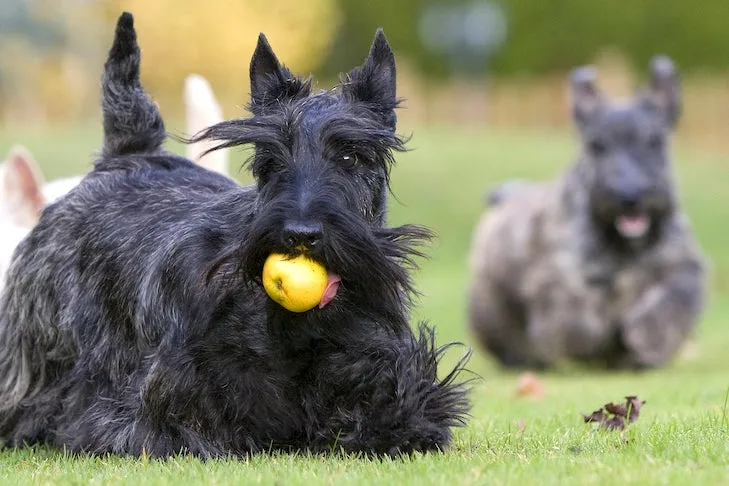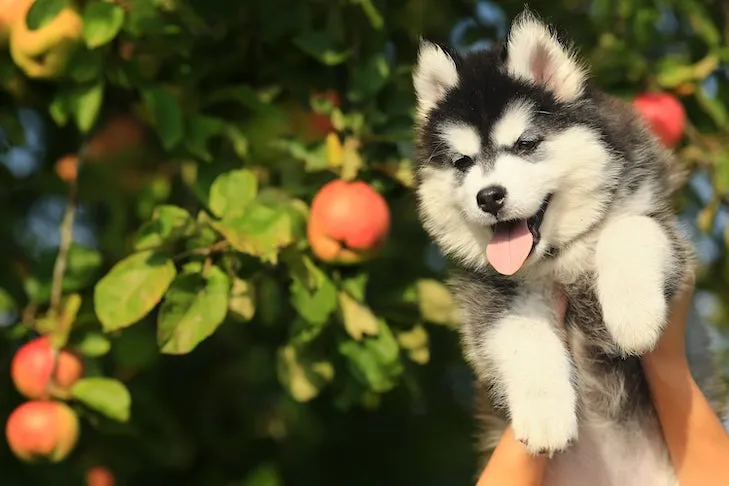Sharing your favorite human snacks with your canine companion can be tempting, especially when they give you those pleading eyes. However, what’s perfectly safe and healthy for us might be dangerous for dogs. Dogs digest food differently than humans, and certain human foods, particularly some fruits, can lead to serious health issues or even be toxic. Understanding What Fruits Not Good For Dogs is crucial for their well-being. While dogs are omnivores and don’t strictly need fruits in their diet, offering dog-safe fruits in moderation as occasional treats can provide beneficial nutrients.
This guide will delve into the fruits that should be strictly avoided to ensure your dog’s safety and health. We’ll cover the specific dangers associated with these fruits and provide clear recommendations to keep your furry friend out of harm’s way.
Fruits Dogs Should Absolutely Avoid
It’s essential to be aware that some fruits, while delicious and harmless for humans, contain compounds, seeds, or parts that are toxic to dogs. Always keep these fruits out of your dog’s reach to prevent accidental ingestion and potential emergencies.
Avocado: A Risky Choice
While avocados are considered a healthy fat source for humans, they are not recommended for dogs. The pit, skin, and leaves of avocados contain a fungicidal toxin called persin. For dogs, persin can cause vomiting and diarrhea. Even the flesh of the avocado, though containing less persin, can still be too much for a dog’s system to handle. Furthermore, avocado is high in fat, which can lead to gastrointestinal upset or even pancreatitis if consumed in excess. If you’re looking for ways to support your dog’s skin and coat health, consider specialized dog treats that include avocado in their formulation, as these are often prepared to be safe for canine consumption.
Cherries: Beware of the Pit
Cherry plants, including the stems and pits, contain cyanide, which is toxic to dogs. Cyanide interferes with cellular oxygen transport, meaning your dog’s blood cells cannot receive adequate oxygen. If your dog ingests whole cherries or cherry pits, symptoms like dilated pupils, difficulty breathing, and red gums can indicate cyanide poisoning, which is a veterinary emergency. Always secure discarded cherry pits in a dog-proof trash can. If you wish to offer your dog the antioxidant benefits found in cherries, opt for cherry-flavored dog treats designed for canine consumption.
Grapes and Raisins: Highly Toxic
Grapes and raisins are among the most dangerous fruits for dogs, regardless of their breed, age, or sex. Even a small amount can lead to acute kidney failure in dogs. It is imperative to be extremely cautious with these fruits around your pets, especially if you have children who might share them. Ensure that any discarded grapes or raisins are disposed of in a secure, dog-proof trash can and not left where your dog can access them.
Tomatoes: Caution with Green Parts
The ripened flesh of a tomato is generally considered safe for dogs in moderation. However, the green parts of the tomato plant, including the leaves and stems, contain a toxic substance called solanine. While a dog would likely need to consume a significant amount of the plant to become ill, it’s best to err on the side of caution and avoid feeding any part of the tomato plant to your dog. If your dog tends to explore your garden, ensure your tomato plants are inaccessible.
Fruits Dogs Can Eat (in Moderation)
While some fruits are off-limits, many can be offered as occasional, healthy treats. Remember that moderation is key, and always remove seeds and pits.
Apples: A Crunchy Treat
Apples are a good source of vitamins A and C, and fiber. They are low in protein and fat, making them a suitable snack for most dogs. However, always remove the seeds and core, as the seeds contain small amounts of cyanide and the core can be a choking hazard. Apples can be a great ingredient in apple-flavored dog treats.
 Scottish Terriers playing in the grass. ©CallallooFred – stock.adobe.com
Scottish Terriers playing in the grass. ©CallallooFred – stock.adobe.com
Bananas: A Sweet, Low-Calorie Option
Bananas are a great low-calorie treat rich in potassium, vitamins, biotin, and fiber. Due to their high sugar content, they should be given sparingly. You can also find banana dog treats that offer the flavor without the sugar overload.
Blueberries: Antioxidant Powerhouses
Blueberries are packed with antioxidants, fiber, and phytochemicals, beneficial for both humans and dogs. They can be a fun treat, and are often found in blueberry dog treats.
Cantaloupe: Hydrating and Nutritious
This melon is nutritious, low in calories, and a good source of water and fiber. However, it’s high in sugar, so it should be offered in moderation, especially for dogs with weight issues or diabetes.
Cranberries: Tart and Tangy in Small Doses
Both fresh and dried cranberries are safe in small quantities. Be mindful of sweetened dried cranberries, opting for unsweetened versions or crunchy cranberry dog treats to avoid added sugars. Too many can lead to an upset stomach.
Cucumbers: Low-Calorie Hydration
Cucumbers are excellent for overweight dogs as they are virtually fat-free and full of hydration. They contain various vitamins and minerals. Frozen cucumber slices can be a refreshing hot-weather snack.
 Dog cucumber ©Sonja – stock.adobe.com
Dog cucumber ©Sonja – stock.adobe.com
Mango: Tropical Vitamins
Mangoes offer vitamins A, B6, C, and E, along with potassium. Always remove the large, hard pit, which can be a choking hazard and contains small amounts of cyanide. Due to its sugar content, serve mango as an occasional treat. Less messy options include chewy mango dog treats.
Oranges: Citrus in Moderation
Oranges are a good source of vitamin C, potassium, and fiber. Offer only the flesh, removing any seeds and the peel, which can be difficult to digest. If your dog isn’t keen on fresh citrus, consider dog treats with oranges.
Peaches: Sweet Summer Treat
Fresh or frozen peaches are a good source of fiber and vitamin A. Ensure the pit is completely removed before serving, as it contains cyanide. Avoid canned peaches due to their high sugar content.
 Siberian Husky puppy being held up in front of an apple tree. AS_Fotos/Getty Images
Siberian Husky puppy being held up in front of an apple tree. AS_Fotos/Getty Images
Pears: Fiber and Vitamins
Pears are a good source of copper, vitamins C and K, and fiber. Cut them into bite-sized pieces and remove the pit and seeds. Like other fruits, avoid canned pears in sugary syrup. You can find pear dog treats with other beneficial ingredients.
Pineapple: Tropical Enzymes
A few chunks of pineapple offer vitamins, minerals, and fiber. The enzyme bromelain can help dogs absorb protein. Remove the prickly rind and crown. Avoid canned pineapple in syrup. Pineapple dog treats are also available.
Pumpkin: Digestive Aid
Pure pumpkin is a fantastic food for dogs, known for its ability to relieve both diarrhea and constipation. Always opt for 100% pumpkin puree and avoid pie filling. Many pumpkin dog treats and supplements are also available.
Raspberries: Antioxidant Rich
Raspberries are safe in moderation, containing antioxidants, fiber, and vitamin C. They have anti-inflammatory properties beneficial for aging joints. However, limit intake to about 8 ounces due to naturally occurring xylitol. Consider dog treats with raspberry as an ingredient.
Strawberries: Vitamin C and Teeth Whitening
Strawberries are a good source of fiber and vitamin C, and an enzyme that can help whiten teeth. Offer them in moderation due to their natural sugar content. Frozen strawberries can be a fun treat. Alternatively, explore strawberry training treats or a strawberry-shaped snuffle mat.
 Pembroke Welsh corgi and strawberry ©Irina – stock.adobe.com
Pembroke Welsh corgi and strawberry ©Irina – stock.adobe.com
Watermelon: Hydration Hero
Watermelon is safe for dogs, but always remove the rind and seeds to prevent intestinal blockages. It’s packed with vitamins and 92% water, making it ideal for hydration on hot days. Frozen watermelon chunks can be a delightful cooling treat. Look for watermelon-flavored dog treats as well.
Conclusion
When it comes to your dog’s diet, vigilance is key. While many fruits can be healthy additions to their diet in moderation, understanding what fruits not good for dogs is paramount to their safety. Always err on the side of caution and consult your veterinarian if you have any doubts about a particular food. By being informed and careful, you can ensure your canine companion enjoys a long, healthy, and happy life, free from the dangers of toxic fruits. If you’re interested in exploring other safe human foods for your dog, you might find our article on what are the best human foods for dogs helpful.
References:
- American Kennel Club. (n.d.). Human Foods Dogs Can and Can’t Eat. Retrieved from https://www.akc.org/expert-advice/nutrition/human-foods-dogs-can-and-cant-eat/
- American Kennel Club. (n.d.). Can Dogs Eat Apples? Retrieved from https://www.akc.org/expert-advice/nutrition/can-dogs-eat-apples/
- American Kennel Club. (n.d.). Can Dogs Eat Bananas? Retrieved from https://www.akc.org/expert-advice/nutrition/can-dogs-eat-bananas/
- American Kennel Club. (n.d.). Can Dogs Eat Blueberries? Retrieved from https://www.akc.org/expert-advice/nutrition/can-dogs-eat-blueberries/
- American Kennel Club. (n.d.). Can Dogs Eat Cantaloupe? Retrieved from https://www.akc.org/expert-advice/nutrition/can-dogs-eat-cantaloupe/
- American Kennel Club. (n.d.). Can Dogs Eat Cranberries? Retrieved from https://www.akc.org/expert-advice/nutrition/can-dogs-eat-cranberries/
- American Kennel Club. (n.d.). Can Dogs Eat Cucumbers? Retrieved from https://www.akc.org/expert-advice/nutrition/can-dogs-eat-cucumbers/
- American Kennel Club. (n.d.). Can Dogs Eat Mango? Retrieved from https://www.akc.org/expert-advice/nutrition/can-dogs-eat-mango/
- American Kennel Club. (n.d.). Can Dogs Eat Oranges? Retrieved from https://www.akc.org/expert-advice/nutrition/can-dogs-eat-oranges/
- American Kennel Club. (n.d.). Can Dogs Eat Peaches? Retrieved from https://www.akc.org/expert-advice/nutrition/can-dogs-eat-peaches/
- American Kennel Club. (n.d.). Can Dogs Eat Pears? Retrieved from https://www.akc.org/expert-advice/nutrition/can-dogs-eat-pears/
- American Kennel Club. (n.d.). Can Dogs Eat Pineapple? Retrieved from https://www.akc.org/expert-advice/nutrition/can-dogs-eat-pineapple/
- American Kennel Club. (n.d.). Can Dogs Eat Raspberries? Retrieved from https://www.akc.org/expert-advice/nutrition/can-my-dog-eat-raspberries/
- American Kennel Club. (n.d.). Feed Dog Strawberries. Retrieved from https://www.akc.org/expert-advice/nutrition/feed-dog-strawberries/
- American Kennel Club. (n.d.). Can Dogs Eat Watermelon? Retrieved from https://www.akc.org/expert-advice/nutrition/can-dogs-eat-watermelon/
- American Kennel Club. (n.d.). Can Dogs Eat Avocado? Retrieved from https://www.akc.org/expert-advice/nutrition/can-dogs-eat-avocado/
- American Kennel Club. (n.d.). Can Dogs Have Cherries? Retrieved from https://www.akc.org/expert-advice/nutrition/can-dogs-have-cherries/
- American Kennel Club. (n.d.). Can Dogs Eat Grapes? Retrieved from https://www.akc.org/expert-advice/nutrition/can-dogs-eat-grapes/
- American Kennel Club. (n.d.). Can Dogs Eat Tomatoes? Retrieved from https://www.akc.org/expert-advice/nutrition/can-dogs-eat-tomatoes/
- American Kennel Club. (n.d.). What Vegetables Can Dogs Eat with Kidney Disease? Retrieved from https://dogcarestory.com/what-vegetables-can-dogs-eat-with-kidney-disease/
- American Kennel Club. (n.d.). What can dogs eat peanut butter? Retrieved from https://dogcarestory.com/what-can-dogs-eat-peanut-butter/
- American Kennel Club. (n.d.). What Fruits and Veggies Are Not Good for Dogs? Retrieved from https://dogcarestory.com/what-fruits-and-veggies-are-not-good-for-dogs/
- American Kennel Club. (n.d.). What Fruits Can Dogs Not Have? Retrieved from https://dogcarestory.com/what-fruits-can-dogs-not-have/
